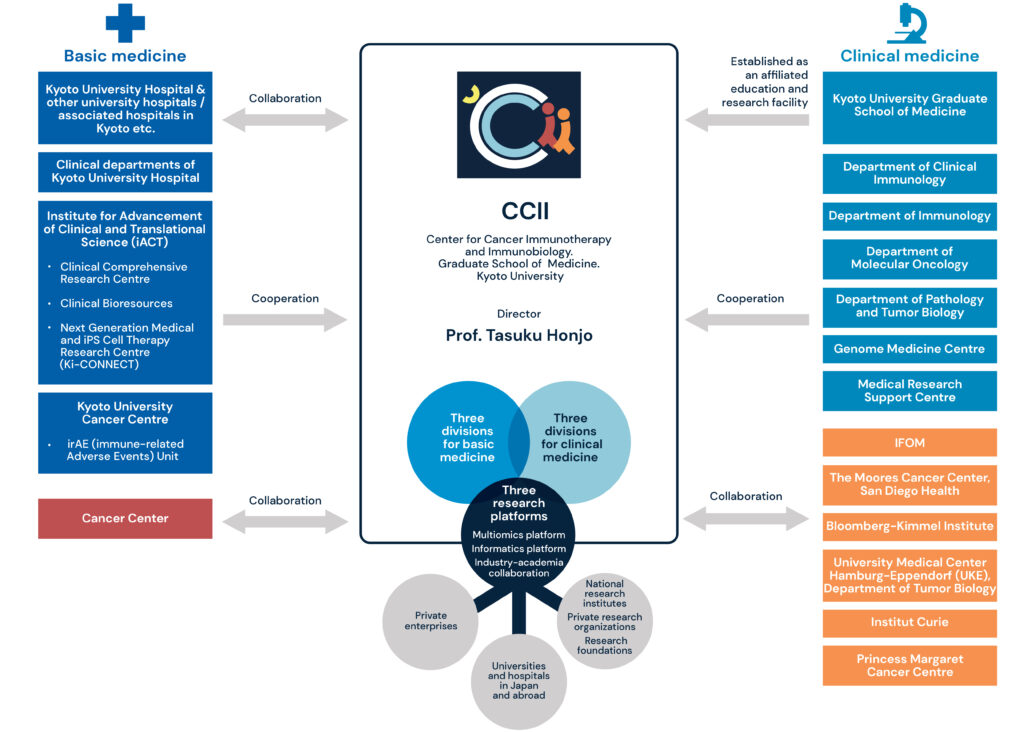Our Goals
As the first immunology research center dedicated to cancer immunology in Japan, our goal is to link fundamental research in immunology and systems biology with clinical investigations on cancer and immunotherapy. We want to bring together scientists from various fields in biology and medicine to advance research on immunotherapy and build the foundation for the next generation of cancer treatments that harness the power of the immune system. Enhancing therapeutic approaches toward cancer that harness the immune system will require both detailed clinical investigations and a much broader view on the biological mechanisms behind successful therapeutic approaches. We firmly believe that the next generation of immune therapies will emerge from an understanding of the immune system and its interactions with cancer at the most fundamental level.
Our foremost goal is to build an open environment in which intellectual exchange and critique thrive, and in which researchers working in different domains and with different specialties communicate and collaborate. Research at CCII is to be organized into six divisions: three divisions focused on fundamental research and three divisions focused on clinical and applied research. Our goal is to create an environment suitable for spontaneous collaboration between basic and clinical research. CCII will also provide special support for collaboration with Kyoto University Hospital and other research hospitals in Japan and overseas, Kyoto University’s translational research organization Ki-CONNECT, and Japanese and global biotechnology and pharmaceutical companies.
Our ambition at CCII is to create an organization that, while embedded into one of the leading research universities in Japan and worldwide, is unique in its outlook and oriented towards a more open future for Japanese university research. Special emphasis will be put on supporting young scientists—embedded in each of the six divisions—through the right balance of mentoring and independence. CCII’s management committee, recruited from among Kyoto University’s Graduate School of Medicine, is supporting the center’s director in important decisions.
Leadership & Management
Organizational Chart

CCII Management Committee
Committee Members
| Name | Affiliation | Note |
|---|---|---|
| Tasuku HONJO | Director, CCII Distinguished Professor, Institute for Advanced Study (KUIAS), Kyoto University Specially-Appointed Professor, Department of Immunology and Genomic Medicine, CCII | Chairperson |
| Sidonia FAGARASAN | Vice-Director, CCII Professor, Division of Integrated High-Order Regulatory Systems, CCII Team Leader, RIKEN Laboratory for Mucosal Immunity (IMS) | |
| Fumihiko MATSUDA | Professor and Director, Center for Genomic Medicine, Kyoto University | |
| Manabu MUTO | Professor, Department of Therapeutic Oncology, Kyoto University | |
| Seishi OGAWA | Professor, Department of Pathology and Tumor Biology, Kyoto University | |
| Hiroshi SENO | Professor, Department of Gastroenterology and Hepatology, Kyoto University | |
| Hideki UENO | Professor, Department of Immunology and Cell Biology, Kyoto University |
Divisions, Labs & Researchers
Research at CCII is organized into six divisions, three divisions focused on fundamental research and three divisions focused on clinical and applied research, supported by two focus areas in analytic research, a “Multi-Omics Platform” and an “Informatics Platform”. The “Department for Genomic Medicine” is dedicated to industry-academia joint research and to our plan to make the new research building into an ideal place for collaborations and joint research. An experimental animal facility in the basement of the building available to all scientists at CCII and Kyoto University.
